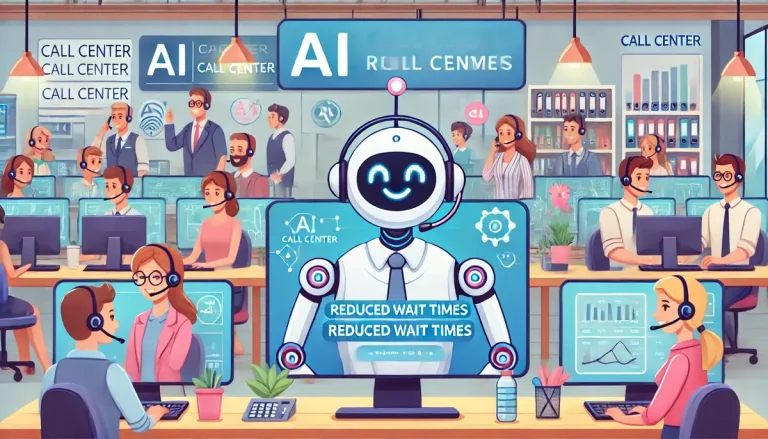Hiring staff for overnight shifts can be costly. It’s expensive, difficult to manage, and often challenging to scale. But what if you could offer 24/7 support without the extra costs? After-hours AI call center solutions are a smart and affordable choice. They handle customer inquiries, turning a major cost center into a source of efficiency and growth.
Let’s discuss how after-hours AI call center solutions maximize your business success!
What Are After-Hours AI Call Center Solutions?
An after-hours AI call center solution is a smart system that uses artificial intelligence to handle customer calls after closing hours. Instead of a live person or an answering machine, this system can talk to callers. Its main goal is to give support 24/7. This ensures you never miss a customer question, no matter the time.
After-hours AI call center solutions can do many different tasks. They can answer common questions and provide information to help customers with simple FAQs. They can process new orders and schedule appointments. They can even help with basic troubleshooting. This type of facility is a big step up from traditional outsourced call centers, which rely on human agents who may not be as familiar with your business. An AI call center is always open to give instant and consistent service. It gives customers the fast and easy support they want, even after hours.
Why After-hours Support Matters for Business Success
After-hours AI call centers build loyal customers for your business. Let’s discuss why after-hours AI support really matters!
24/7 Customer Expectations
Customers expect businesses to be available 24/7. The traditional 9-to-5 workday is no longer enough, especially in a global market. A customer might have a question late at night. Or they might be in a different time zone. If they can’t get help right away, they will probably go to a competitor. Offering after-hours support is not a luxury. It is a must for staying competitive.
Missed Opportunities Occur When Customers Cannot Reach Businesses.
Suppose a customer calls after hours and reaches an empty line or a voicemail. That is a missed chance to make a sale, solve a problem, and build a relationship. These missed chances add up. They can damage your business’s profits a lot. A good after-hours solution makes sure every call is handled. This turns possible losses into valuable customer interactions.
Higher Customer Satisfaction and Loyalty
Besides preventing losses, 24/7 AI support builds stronger customer relationships. When customers get help right away, they become more satisfied. It shows them that you care about their time and are dedicated to their needs. This rapid response builds trust and loyalty. Such loyal customers come back to your business again and again. Customer experience is a key difference between companies. Providing support around the clock is one of the best ways to secure your business’s long-term success.
Key Benefits of AI Call Centers for After-hours Support
Using an AI call center for after-hours support can change your business. It is not just about being open 24/7. It is also about improving your service in several important ways.
Cost Savings & Efficiency
A major benefit is saving money. Hiring a team for overnight shifts is costly. It involves high salaries, benefits, and overtime pay. An AI call center gets rid of all these costs. The AI is capable of managing multiple calls concurrently. The cost per call is much lower than with a person. The result means your business can handle more calls without hiring more staff. Your operations become much more efficient and cheaper.
Consistent Customer Experience
AI offers a level of consistency that people cannot. An AI system does not get tired. It does not get frustrated or distracted. It gives the same professional response every single time. This ensures every customer gets the same high-quality service, regardless of when they call. The AI also uses a consistent tone. It provides correct information all the time. This removes the risk of human mistakes or bad communication.
Scalability & Flexibility
AI call centers can scale up easily. They can handle sudden increases in calls during a product launch or a holiday season. If your business suddenly gets many calls, an AI system can handle it smoothly. You do not have to worry about hiring extra staff for busy times. You also will not have agents sitting idle during slow times. The AI solution is always ready to meet demand. It is a flexible and dependable solution.
Data & Insights for Smarter Decisions
An AI call center does more than just answer calls. It collects and analyzes a lot of data from every single call. This data can give you insights into what customers do. You can get information about common problems. You can understand what your customers really want. These insights help your business make better decisions. You can improve your products and services and make the overall customer experience better.
How After-hours AI Solutions Improve Customer Engagement
After-hours AI solutions give you a competitive edge over your competitors by improving your customer experience via better engagement. Let’s discuss how AI really does it!
Personalized Responses using CRM integration
AI call centers provide more than just call answering services. They work to make customers feel better about your business. One key way is through personalization. An after-hours AI solution can connect to your CRM system. This lets it access a customer’s past information. When a customer calls after hours, the AI knows their past purchases or problems. Such knowledge helps provide a more personal and helpful answer.
Multi-language and Multi-channel Support (voice, chat, email)
These solutions also support many languages and channels. An AI can handle calls in different languages. Such functionality removes communication problems. It makes global customers feel more welcome. It can also manage customer conversations across different platforms like voice, chat, and email. This means a consistent experience no matter how the customer reaches out.
Smooth Handover to Human Agents During Business Hours
A smooth handover to human agents is a crucial part of this system. If a problem is too difficult for the AI, it will not leave the customer. Instead, the AI will gather all the details. It will then transfer the call to a person when the business opens again. This procedure means the customer does not have to repeat their story. This reduces frustration for everyone and makes the process more efficient.
Building Trust with an Always-Available Service.
After-hours AI solutions build trust by always being available. Customers know they can get help at any time. This makes them feel secure. This consistent, 24/7 service builds strong customer relationships. It also helps your business stand out.
Choosing the Right After-hours AI Call Center Solution
Not all AI solutions have the same features and are best for your needs. You have to carefully look for the properties that best suit your business requirements. Let’s go through the process of choosing the right after-hours AI call center solution for your business!
Features to look for
Finding the right AI solution for your business is a big choice. You need to look for certain features that will ensure you find the best fit.
Natural Language Processing (NLP)
A top feature to look for is Natural Language Processing (NLP). The AI should understand human speech well. It should recognize different accents, tones, and what a person means. A basic AI that only understands keywords will annoy your customers. You also need to check for integrations. The solution should connect easily with your CRM and other business systems. Such connectivity allows the AI to provide personalized service. The solution also allows for smooth data transfer.
Compliance
Before choosing your after-hours AI call center, you must think about compliance. If the AI makes any outgoing calls, you must follow TCPA (Telephone Consumer Protection Act). This law states that businesses must get clear permission from customers before making automated or prerecorded calls. A trustworthy company will have tools to help you stay compliant. This regulation protects your business from legal problems.
Questions Businesses Should Ask Before Investing
When you compare different vendors, look at a few main things. How well can their system grow? Can it handle a sudden increase in calls easily? What is their pricing? Is it based on how much you use it or a set fee? Furthermore, ask about their support. What kind of help do they offer if you have an issue? Ask about their security and how they handle data.
FAQs
How do after-hours AI call centers work?
After-hours AI call centers use artificial intelligence to understand customers and respond to them. They greet callers and use NLP to understand what the customer needs. The AI can then provide information and answer questions. It can even do tasks like scheduling appointments without a human agent.
Are AI call centers cheaper than hiring live agents overnight?
Yes, they are cheaper. AI call centers eliminate the high costs of overnight staffing. This price includes salaries, benefits, and overtime pay. AI can handle many calls at once. The cost for each call is much lower than with a person. This advantage makes them a more affordable way to provide 24/7 support.
Can AI handle complex customer requests or only simple ones?
AI is excellent at handling common questions and simple, repeated tasks. For hard problems, the AI collects all the information from the customer. It then transfers the call to a human agent when the business opens again. This makes sure the customer’s problem is solved, and they do not have to repeat their story.
How do AI call centers ensure compliance with regulations like TCPA?
AI call centers must be built to follow strict rules. This is how they comply with laws like the TCPA. A reliable AI solution will have built-in features to make sure a business gets proper permission from customers. This protects the business from legal issues and fines.
What industries benefit most from after-hours AI support?
Industries with a lot of simple customer questions benefit the most. This includes healthcare, finance, and e-commerce. Healthcare can use it for scheduling appointments. Finance can use it for account questions. E-commerce can use it for order tracking. These businesses can use AI to do common tasks to let their human agents focus on more complex needs.








